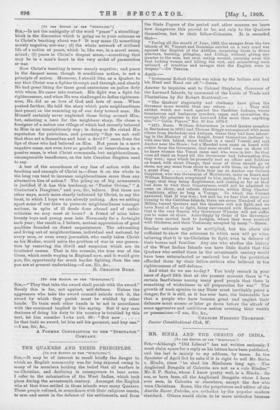THE QUAKERS AND THEIR PRINCIPLES.
[TO vils EDITOR or TUE "HriMATote.".1 SIR,—It may be of interest to recall briefly the danger to which an English community was for long exposed owing to many of its members holding the belief that all warfare is un-Christian, and declining in consequence to bear arms. I refer to the colonisation of the West Indies, which took place during the seventeenth century. Amongst the English who at that time settled in those islands were many Quakers These people refused, in accordance with their religions tenets, to arm and assist in the defence of the settlements, and from the State Papers of the period and other sources we learn how dangerous this proved to be, not only to the Quakers themselves, but to their fellow-Colonists. It is recorded that— "During all the month of June, 1666, the savages from the two islands of St. Vincent and Dominica carried on a very cruel war against the English of the Antilles, surprising them in divers quarters, burning, pillaging, and killing, without giving any quarter to the mon, but even eating several, carrying away the best looking women and killing the rest, and committing such unheard of cruelties and ravages that the English were in despair."—Du TERTRE.
Again:—
" Governour Robert Carden was taken by the Indians and bad his Head and Hand cut off."—Bsess.
Answer to inquiries sent to Colonel Stapleton, Governor of the Leeward Islands, by command of the Lords of Trade and Plantations by Sir Robert Southwell :— " The Quakers' singularity and obstinacy have given the Governor more trouble than any others. . . . . . They will neither watch nor ward against the Caribboo Indians, whose treacherous and barbarous murders, rapes, and enormities dis- courage the planters in the Leeward Isles more than anything elso."—" Colon. Papers," Rec. 25 Jan. 1676-7.
"1671. Nevis. William Edmunclson [a noted Quaker preacher in Barbadoes in 1675] and Thomas Briggs accompanied with some others from Barbadoes and Antigua, where they had been labour- ing in the Ministry of the Gospel, found themselves inclined to visit also this Island, came thither in a small Vessel!, and cast Anchor near the Shore ; but a Marshal soon came on board with orders from the Governour, that none should come on shore till he knew whence the Vessel came and who wore in her : So they were all staid on board till the Governour had Information Who they were ; upon which he presently sent an officer and Soldiers on board, with strict Charge, that none of them should go on shore, nor any oome from shore to speak with them, on Penalty of a great Pine While they lay at Anchor one Colonel Stapleton, who was Governour of Montserrat, came on Board and William Edmundson complained to him, saying, It was very hard Usage, that they being Englishmen, and coming so far as they had done to visit their Countrymen, could not be admitted to come on shore, and refresh themselves, within King Charles' Dominions, after so long a Voyage. To which the Colonel answered, that It was true ; but said he, we hear that since your Coming to the Caribbee-Islands, there are seven Hundred of our Militia turned Quakers and the Quakers will not fight, and we have Need of Men to fight, being surrounded with Enemies, and that is the very Reason why Governour Wheeler will not suffer you to come on shore. Accordingly by Order of the Governour they were carried back to Antigua, where they were received with Gladness, and their Testimony accepted by ruany."—Bssaa.
Similar extracts might be multiplied, but the above :ire sufficient to show the extremes to which men will go when believing that ibis un-Christian to fight, even in defence of their homes and families. Any one who studies the history of the West Indian Islands can have little doubt that the Quakers who settled there in the seventeenth century would have been exterminated or enslaved but for the protection afforded them by their fellow-settlers who believed in the righteousness of self-defence.
And what do we see to-day P You truly remark in your issue of April 24th that at the present moment there is "a certain fearfulness among many good people that there is something of wickedness in all preparation for war." The growth of such opinion in any State must inevitably prove a danger, for it is still, as it has ever been, the inexorable law that a people who have become great and neglect their defences must sooner or later go down before the attack of some aggressive and ambitious nation coveting their wealth or possessions.—I am, Sir, &c.,
CHARLES HERBERT THOMPSON,
Junior Constitutional Club, W.










































 Previous page
Previous page